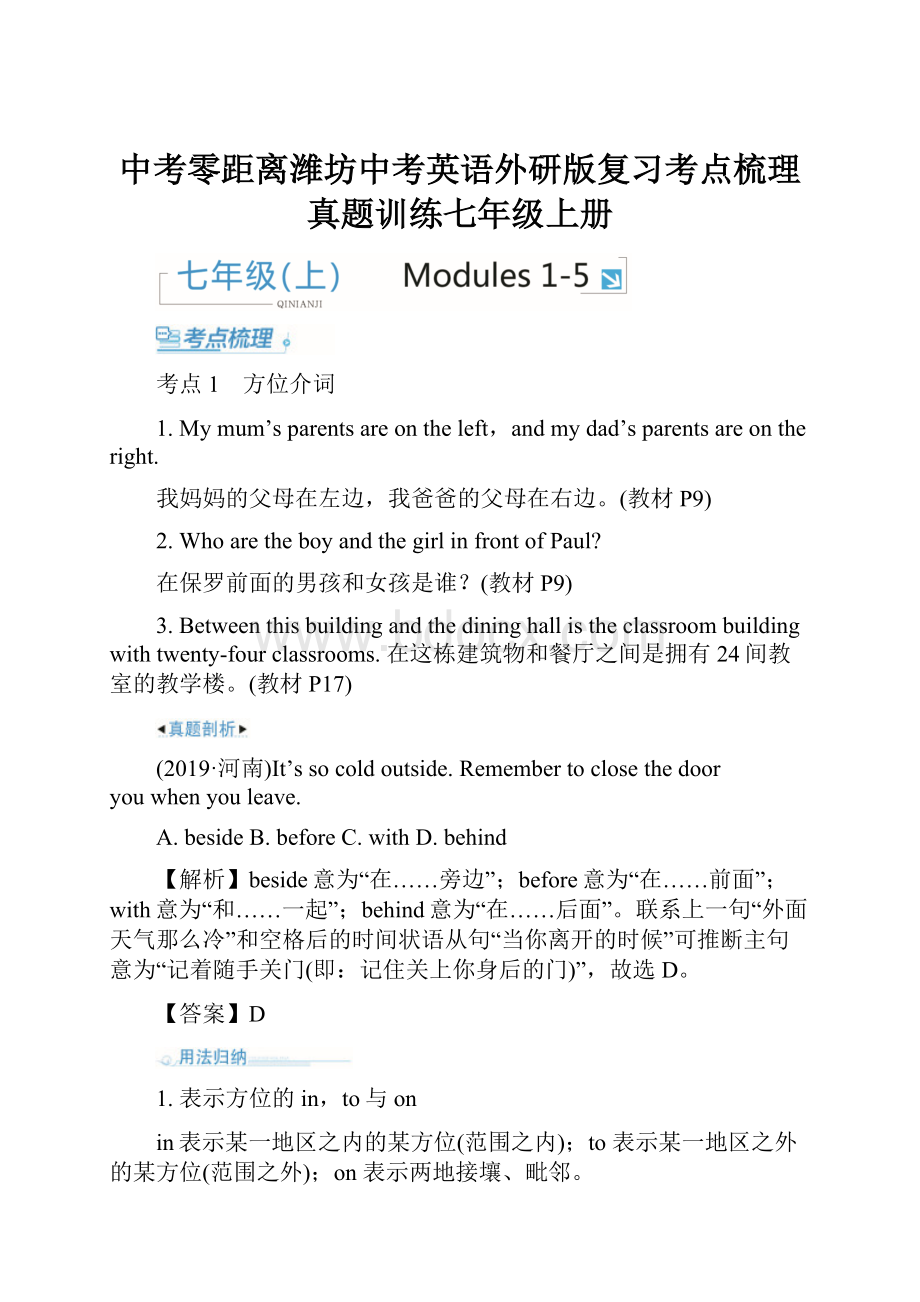中考零距离潍坊中考英语外研版复习考点梳理真题训练七年级上册.docx
《中考零距离潍坊中考英语外研版复习考点梳理真题训练七年级上册.docx》由会员分享,可在线阅读,更多相关《中考零距离潍坊中考英语外研版复习考点梳理真题训练七年级上册.docx(36页珍藏版)》请在冰豆网上搜索。

中考零距离潍坊中考英语外研版复习考点梳理真题训练七年级上册
考点1 方位介词
1.Mymum’sparentsareontheleft,andmydad’sparentsareontheright.
我妈妈的父母在左边,我爸爸的父母在右边。
(教材P9)
2.WhoaretheboyandthegirlinfrontofPaul?
在保罗前面的男孩和女孩是谁?
(教材P9)
3.Betweenthisbuildingandthedininghallistheclassroombuildingwithtwenty-fourclassrooms.在这栋建筑物和餐厅之间是拥有24间教室的教学楼。
(教材P17)
(2019·河南)It’ssocoldoutside.Remembertoclosethedoor youwhenyouleave.
A.besideB.beforeC.withD.behind
【解析】beside意为“在……旁边”;before意为“在……前面”;with意为“和……一起”;behind意为“在……后面”。
联系上一句“外面天气那么冷”和空格后的时间状语从句“当你离开的时候”可推断主句意为“记着随手关门(即:
记住关上你身后的门)”,故选D。
【答案】D
1.表示方位的in,to与on
in表示某一地区之内的某方位(范围之内);to表示某一地区之外的某方位(范围之外);on表示两地接壤、毗邻。
FujianisinthesoutheastofChina.福建位于中国的东南部。
JapanistotheeastofChina.日本在中国的东面。
HubeiisonthenorthofHunan.湖北在湖南的北面。
2.infrontof与inthefrontof
infrontof表示“在……的前面(范围外)”;inthefrontof表示“在……的前部(范围内)”。
Therearemanytreesinfrontoftheclassroom.在教室前面有很多树。
Thereisateacher’sdeskinthefrontoftheclassroom.在教室的前面有一张讲桌。
3.常用的表示方位的介词和介词短语还有:
between...and...在……和……之间;opposite=acrossfrom在……对面;ontheleft/right在左边/右边。
1.(2019·湖南岳阳)Thebankis thebookstoreandthepostoffice.
A.atthefrontofB.amongC.between
2.(2019·贵州六盘水)Liupanshuiisacity thesouthwestofChina.
A.atB.forC.inD.on
【答案】1.C 2.C
考点2 therebe句型
1.There’samapoftheworldinourclassroom,buttherearen’tanypicturesonourwalls.
我们教室里有一张世界地图,但我们教室的墙上没有任何图片。
(教材P14)
2.Therearesixsciencelabsandfivecomputerroomsinthesciencebuilding.
在科学楼里有6间科学实验室和5间微机室。
(教材P17)
(2019·武汉)—What’sthematter,Jenny?
— somethingwrongwithmybike.
A.ItisB.ThereisC.IhaveD.Ithas
【解析】Thereissomethingwrongwith...是固定句式,意为“……出问题了”。
故选B。
句意:
“珍妮,发生了什么事情?
”“我的自行车出问题了。
”
【答案】B
therebe句型表示某地有某物,其中be动词与最近的主语在数上保持一致,即“就近原则”。
如:
Thereisatableandtwochairsintheroom.在房间里有一张桌子和两把椅子。
其一般将来时结构是therewillbe或thereis/aregoingtobe。
1.Driveslowly,Mary. issomethingaheadontheroad.
A.ItB.ThisC.ThatD.There
2.Theweatherforecastsaysthat anotherstormtomorrow.
A.therewillhaveB.therewillbeC.therehasD.therehasbeen
3.(2019·乌鲁木齐)—ShallwehangoutinGreatBazzar(大巴扎)tomorrow?
—I’mafraidnot. thefinalgameoftheWorldCuponTV.
A.ThereisB.Therewillbe
C.TherewillhaveD.Thereisgoingtohave
【答案】1.D 2.B 3.B
考点3 Itis+adj.(+for/ofsb.)+todosth.
Itisimportanttoremember:
eatwell,stayhealthy,anddon’tgetfat!
记住这些很重要:
吃得好,保持健康,不发胖!
(教材P22)
(2019·江苏连云港)Itisgreat ustogetsomanyfavouritebooksonInternationalChildren’sBookDay.
A.toB.withC.ofD.for
【解析】It’s+adj.+for/ofsb.todosth.意为“某人做某事是……的”,为固定句式,故排除A、B两项;在这一固定句式中,若形容词是说明人的性格的则用介词of,若是说明事物的则用介词for;题干中great是说明事物的,故介词用for,选D。
【答案】D
在Itis+adj.+for/ofsb.todosth.句型中,it是形式主语,真正的主语是后面的todosth.,意为“对某人来说做某事是……的”。
当adj.描述人的品性时,如nice,kind,polite等,后面介词用of;当adj.描述事物的性质特征时,如important,difficult,possible等,后面介词用for。
ItisimportantforustolearnEnglishwell.对我们来说,学好英语很重要。
It’sverykindofyoutosayso.你这样说太好了。
1.Itisveryimportant peopletohavefoodandwatereveryday.
A.forB.ofC.withD.about
2. isusefulforus aforeignlanguage.
A.It;knowB.That;knowC.It;toknowD.That;toknow
3.(2019·长沙)It’snecessaryforus toourparentswhenwehaveproblems.
A.totalkB.talkingC.talk
【答案】1.A 2.C 3.A
考点4 人称代词、物主代词和反身代词的考查
1.Thewomannexttoherismydad’ssister,myauntLiz.
她旁边的女人是我爸爸的妹妹,我的姑姑莉兹。
(教材P9)
2.IlovehistoryandI’mgoodatit.It’smyfavouritesubjectbecauseit’sveryinteresting.
我喜欢历史并且擅长历史。
它是我最喜欢的科目,因为它很有趣。
(教材P26)
3.Afterschooltheygoswimming,playfootball,havemusiclessonsandplaywiththeirfriends.
放学后他们去游泳、踢足球、上音乐课并且跟朋友们一起玩。
(教材P31)
(2019·北京)Mybrotherwillcometoseemetomorrow.I’llmeet attheairport.
A.herB.youC.himD.them
【解析】her意为“她”,用作女性的第三人称单数人称代词宾格,或者意为“她的”,用作形容词性物主代词;you意为“你;你们”,可用作第二人称单数或复数的人称代词主格或宾格;him意为“他”,用作男性的第三人称单数人称代词宾格;them意为“他们”,用作第三人称复数的人称代词宾格。
空格处的“他”作meet的宾语,指的是mybrother(我哥哥),应用him。
句意:
我哥哥明天要来看我。
我要去机场接他。
【答案】C
代词
第一人称
第二人称
第三人称
单
复
单
复
单
复
主格
I
we
you
you
he
she
it
they
宾格
me
us
you
you
him
her
it
them
形容词性物主代词
my
our
your
your
his
her
its
their
名词性物主代词
mine
ours
yours
yours
his
hers
its
theirs
反身代词
myself
ourselves
yourself
yourselves
himself
herself
itself
themselves
1.主格用作主语;宾格多用作宾语;形容词性物主代词用作定语,后面加名词,提问用whose;名词性物主代词常用来代替前面已提及的名词,相当于“形容词性物主代词+名词”。
2.含反身代词的常用短语:
teachoneself自学
learnbyoneself自学
enjoyoneself玩得高兴
helponeselfto随便吃
saytooneself自言自语
1.(2019·上海)Theretiredcouplehavedecidedtogotocollege.It’stimefor tobeginanewlife.
A.theyB.themC.theirD.theirs
2.(2019·重庆)—Doyoulikewatchingping-pongmatches?
—Yes,and favoriteping-pongplayerisMaLong.
A.weB.usC.ourD.ours
3.(2019·温州)Jennyhasasweettooth.Let’smakesomecookiesfor .
A.meB.himC.herD.them
【答案】1.B 2.C 3.C
1.Mr.Green’sofficeis the26thfloor.Youcantaketheliftthere.
A.atB.inC.onD.for
C
句意:
格林先生的办公室在26楼。
你可以乘电梯去那儿。
表示“在第几楼层”用介词on。
故选C。
2.—IsyouriPadblack,Jenny?
—No,itisn’t. iswhite.
A.YoursB.MineC.HersD.His
B
本题考查名词性物主代词。
根据题意此处表示“我的iPad”,所以选Mine。
3.There abasketballgamebetweenClass8andClass12tomorrowafternoon.
A.isB.hasC.willbeD.hasgot
C
根据时间状语tomorrowafternoon知,该句要用一般将来时;therebe句型的一般将来时结构是therewillbe或thereis/aregoingtobe,故选C。
4.(2019·苏州)—Here’saboxofchocolateonourdesk.Formeorforyourmom?
—It’s ,Dad.HappyFather’sDay!
A.hersB.herC.yoursD.you
C
hers“她的”,为名词性物主代词;her意为“她;她的”,为人称代词宾格或形容词性物主代词;yours“你的,你们的”,为名词性物主代词;you意为“你;你们”,为人称代词。
分析句子结构可知,空格处所填内容应作表语,因此要用名词性物主代词,排除B、D两项。
由后句HappyFather’sDay!
(父亲节快乐!
)可知,前句应意为“是给你的,爸爸”。
故选C。
5.(2019·南宁)Sheismyfriend. nameisBetty.
A.ItsB.HisC.HerD.My
C
its“它的”;his“他的”;her“她的”;my“我的”。
由上句Sheismyfriend.(她是我的朋友。
)中she(她)可知,此处填her(她的)才能与前面句子的主语在人称和性别上保持一致。
一般现在时
1.谓语构成:
一般现在时可以使用动词原形,如果主语是第三人称单数,一般在动词原形后加-s或-es。
如:
Tomoftenhelpshisparentsdohouseworkathome.汤姆在家经常帮助父母做家务。
SometimesLucywashesherclothesherself.有时候露西自己洗衣服。
2.用法:
(1)表示经常性或习惯性的动作或存在的状态,与表示频率的副词或短语连用。
(2)表示客观事实或普遍真理。
如:
Theearthgoesaroundthesun.地球绕着太阳转。
(3)在时间、条件等状语从句中,用一般现在时表将来。
简记为“主句将来,从句现在”。
如:
Ifitrainstomorrow,wewon’tgotothepark.如果明天下雨,我们就不去公园了。
(4)在某些以here,there开头的句子中,用一般现在时表示正在发生的动作。
如:
Theregoesthebell.铃响了。
3.与一般现在时连用的时间状语有:
(1)often,always,usually,sometimes,seldom,never;
(2)onSundays,everyday,everymorning,everyyear;
(3)onceayear,twiceamonth,threetimesaweek等表示频率的词组。
4.动词的第三人称单数形式
在动词原形后加-s
runs,likes
以ch,sh,s,o,x结尾的动词,在词尾加-es
teaches,washes,passes,goes
以辅音字母加y结尾的动词,先将y变为i再加-es
studies,tries
以元音字母加y结尾的动词,在词尾加-s
stays,plays
1.(2019·河北)Grandpa glasseswhenhereads.
A.wearsB.woreC.haswornD.waswearing
A
wears是动词wear的第三人称单数形式,用于一般现在时;wore是wear的过去式,用于一般过去时;hasworn是现在完成时的结构;waswearing是过去进行时的结构。
分析题干可知,本句为含有when引导的时间状语从句的主从复合句,从句用了一般现在时,主句应用现在的某种时态,故排除B、D两项;结合选项可知句意为“当爷爷阅读时,他戴眼镜”。
表示动作经常发生,应用一般现在时,故选A。
2.Whenyou atarestaurant,pleaseorderjustenoughfood.
A.eatB.willeatC.ateD.haveeaten
A
主句是祈使句,且此处讲述一般情况,故when引导的时间状语从句用一般现在时。
故选eat。
3.Ourgeographyteachertoldusthemoon aroundtheearth.
A.moveB.movedC.willmoveD.moves
D
宾语从句表示客观事实或普遍真理时,要用一般现在时,故选moves。
4.(2019·河北)Grace thisgameeverytimeweplay.
A.winsB.wonC.willwinD.haswon
A
由时间状语everytime可知,“格雷丝赢得比赛”是经常性的,因此要用一般现在时态。
主语Grace是第三人称单数,因此谓语动词要用其第三人称单数形式wins。
5.(2019·武汉)—Whoisthatlady?
—She’sMissGreen.She usmusic,andsheissogood.
A.taughtB.teachesC.willteachD.isteaching
B
联系问句可知,此处谈论的是现在的情况,应用一般现在时态。
该句的主语为she,应用teach的第三人称单数形式teaches。
故选B。
(时间:
30分钟,满分:
60分)
一、重点单词拓展(共10分)
1.have(v.)→ (第三人称单数形式)有→ (过去式)有
2.forget(v.)→ (反义词)记得
3.it/they(pron.)→ (pron.)它的/他们的,她们的,它们的
4.America(n.)→ (形容词)美国的
5.potato/tomato(n.)→ (复数)土豆/西红柿
6.same(adj.)→ (反义词)不同的
7.tooth/child(n.)→ (复数)牙齿/孩子
8.easy(adj.)→ (adv.)容易地→ (反义词)困难的
9.health(n.)→ (adj.)健康的→ (adj.)不健康的
10.free(adj.)闲的→ (adv.)自由地→ (反义词)忙碌的
1.has;had 2.remember 3.its/their 4.American 5.potatoes/tomatoes 6.different
7.teeth/children 8.easily;difficult 9.healthy;unhealthy 10.freely;busy
二、短语翻译(共10分)
1.在左边,在左侧
2.在……旁边,紧挨着
3.在……和……(两者)之间
4.去购物
5.有点儿累
6.吃早餐
7.记得去做……
8.保持健康
9.对……好/不好
10.开始睡觉;入睡
1.ontheleft 2.nextto 3.between...and... 4.goshopping 5.abittired 6.havebreakfast 7.remembertodo 8.stayhealthy 9.begood/badfor 10.gotosleep
三、句型转换(共10分)
1.AtschoolLilylikeshistorybest.(改为同义句)
AtschoolLily’s ishistory.
2.Therearesomecarrotsinthekitchen.(改为一般疑问句)
there carrotsinthekitchen?
3.Paulhasmathsintheafternoon.(改为一般疑问句)
Paul mathsintheafternoon?
4.Wehavescienceathalfpastnine.(对画线部分提问)
you science?
5.HasJimgotasister?
(作否定回答)
, .
1.favouritesubject 2.Are,any 3.Does,have 4.Whendo,have 5.No,hehasn’t
四、用所给词的适当形式填空(共10分)
1.Historyis (I)favouritesubjectbecauseit’sinteresting.
2.Betweenthisbuildingandthedininghall (be)theclassroombuildingwithtwenty-fourclassrooms.
3.It’simportant (remember):
eatwell,stayhealthyanddon’tgetfat.
4.Afterschooltheygo (swim),playfootball,havepianolessonsandplaywiththeirfriends.
5.There (be)sixsciencelabsandfivecomputerroomsinthesciencebuilding.
1.my 2.is 3.